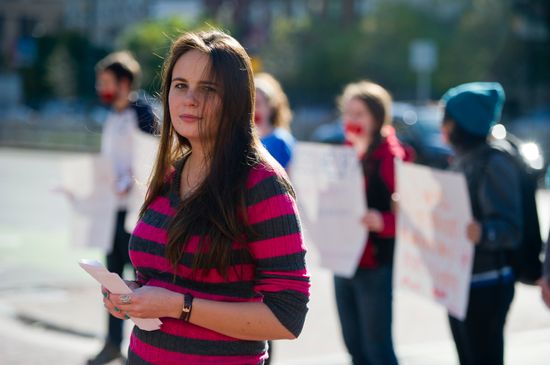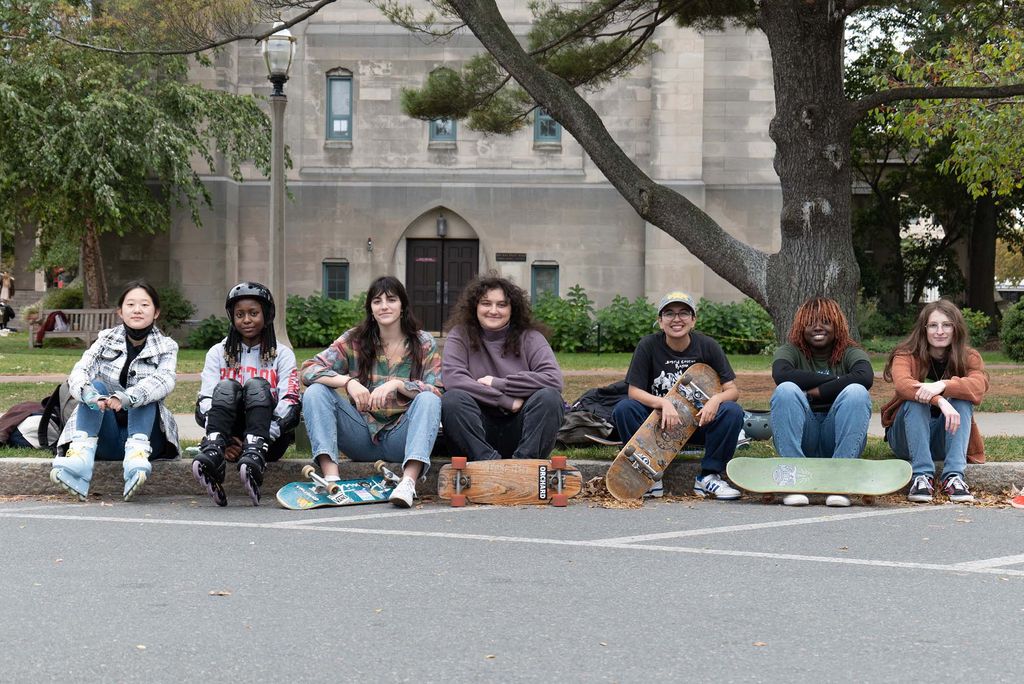A Campus Minority: Students Against Abortion
At BU, students agree to disagree respectfully on a hot topic

BU Students For Life including, at center, Katherine Sennott (CAS’16) during their Silent Victims vigil in Marsh Plaza October 30, 2014. Photos by Cydney Scott
Single children are hardly unusual: more than four out of every 10 American families with kids has just one. But only-child status has always haunted Sylvia Olejnik. “My mom had two miscarriages when I was little,” she says. Olejnik was so young that she barely understood what had happened, but 10 years later, as she was drifting off to sleep one night, she recalled a childhood moment when she hugged her pregnant mom.
“Something clicked in my head, and I was able to connect the feeling of loneliness that I had felt for a great portion of my life to me not having siblings,” says Olejnik (CAS’16). “I wept that night.” The conviction that potential family members had been amputated by fate led her to believe that life begins at conception and abortion is wrong, a conviction reinforced by Catholic school education in her home state of Connecticut.
Olejnik, president of BU Students for Life, was to be in Washington, DC, today with about 10 BU students for the March for Life, an annual protest of the Supreme Court’s 1973 decision to legalize abortion. Surrounded by hundreds of thousands of like-minded citizens, the group will have a moment in a majority that it doesn’t enjoy on campus. With no more than 20 members in her group, Olejnik knows her views are not widely held at BU, a point seconded by one student leader who supports abortion rights.
Yet for an issue that has created combustible, even murderous, situations off-campus, students in both camps say they’ve engineered civil relations and mutual respect.
“The binary of ‘pro-life’ and ‘pro-choice’ has created an unnecessary divide that marginalizes a vast number of students who find their opinions somewhere in the middle,” says Isabel Elliott (CAS’15), codirector of the abortion rights group Students for Reproductive Justice. She attended a pregnancy and parenting resource forum put on by Students for Life in the last academic year. “It’s important to have conversations happening on all sides, as well as all of the areas between those sides,” Elliott says. “Students need to be given all of the information in order to form their own opinions, and then feel like those opinions have a safe space to be heard on campus.”
Gallup confirms that most Americans fall in the middle of the abortion debate. In 2012, 28 percent of those surveyed told the pollster that abortion should be “legal under any circumstances,” while 18 percent wanted it banned outright. Fifty-two percent favored keeping it “legal only under certain circumstances.”
While Olejnik says it’s “difficult” for anti-abortion students to disclose their views in conversations with peers, that hasn’t stopped Students for Life and those who disagree with it from collaborating. With help from former BU Behavioral Medicine director Margaret Ross, the group put together the Resource Guide for Pregnant and Parenting Students, which can be viewed online via the University’s Student Health Services site.

“She was amazing,” former Students for Life president Anne Pierce (SED’14) says of Ross. “She met with me and was so helpful in getting this packet more available to students.” For her part, Ross, who is pro–abortion rights, agrees that the project showed how people differing on abortion needn’t be antagonists. “You can be pro-choice and still want a person electing to hold onto a pregnancy to have resources,” she says. “I think there’s room on any campus for many different points of view, and this did not seem to me to be mutually exclusive.…I thought it was great that this group put together the resources.”
It’s also true that, in a state that has discussed how close abortion protesters can get to clinics and their patients—the US Supreme Court invalidated Massachusetts’ old buffer zone law last year—Students for Life has reversed past practice and shies away from group participation in such picketing.
“We feel like our club is not religiously affiliated, and it’s not politically affiliated,” Olejnik says. “And a lot of organizations that do stand outside of clinics are religiously affiliated organizations, and we were asked by them to stand outside of Planned Parenthood. And we want to take our stance secularly.”Instead, the group organizes events such as last October’s Silent Witness on Marsh Plaza, where members stood with tape reading “LIFE” over their mouths. That month, it also hosted Students for Life America’s national We Care Tour, which highlights campus sexual assault while advocating against abortion for victims impregnated through rape. Individual members of the group, most of whom are Christian and especially Catholic, are free to join pickets, Olejnik says.
Liana Genito joined Students for Life while enrolled at the College of Communication (she transferred to Emerson College last year). A rarity for the group, she was a non-religious student who “never relied on religion for any answers,” she says. Yet she found her religious peers in the group welcoming, and Students for Life “provided a new and improved image of pro-life for me.…They had logical reasoning, humble and gentle approaches and, best of all, the group didn’t just preach banning abortion,” but supported help for students keeping and raising children.
Genito agrees that BU is a tolerant campus for diverse opinions about abortion: “I feel far more uncomfortable to admit I’m pro-life at my current college.”
Elliott says that while her group and Students for Life “fundamentally disagree on access to abortion, there are plenty of areas where common ground can be reached. I think our groups get falsely pitted against each other.…Coming at situations in the mindset that there is one right and one wrong answer doesn’t foster constructive dialogue or activism.”
Yet if Gallup is correct, some otherwise anti-abortion Americans would part with Olejnik when she says abortion shouldn’t be allowed even in such cases as rape or a pregnancy-related threat to the mother’s life. The latter point is not academic for her, she says; she had a friend in elementary and middle school whose pregnant mother foreswore chemo for her cancer—and died—to protect her fetus. “They have this beautiful girl…and then her mom passed away,” Olejnik says. “I’ve seen these actual people having to choose life or not.”
Students for Life’s “pro-life” platform includes other planks, opposition to the death penalty and physician-assisted suicide among them. Olejnik’s anti–death penalty stance is as emotionally fraught as her abortion views: family members of her high school best friend were murdered, she says. “I saw the hurt that he was going through.
Students who oppose abortion but think it should be legal under exceptional circumstances, or are in favor of the death penalty, Olejnik says, would still be welcomed to join Students for Life. “We’re all learning.…We’re trying to learn the reasons why we say abortion is wrong in all cases. That’s education, which is what we’re trying to do.”
This Series
Also in
BU Clubs
-
May 3, 2022
Promoting the Beauty of Natural Hair
-
April 27, 2022
Yes, BU Has an Equestrian Team. And It Just Had a Record Season
-
April 6, 2022
BU Climbing Club: Rookies, Vets Test Their Physical and Mental Agility


Comments & Discussion
Boston University moderates comments to facilitate an informed, substantive, civil conversation. Abusive, profane, self-promotional, misleading, incoherent or off-topic comments will be rejected. Moderators are staffed during regular business hours (EST) and can only accept comments written in English. Statistics or facts must include a citation or a link to the citation.